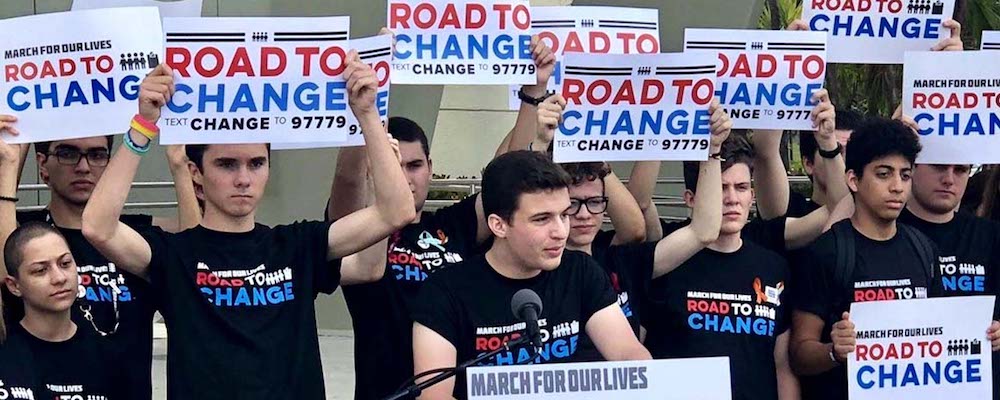‘Parkland Rising’ Chronicles How Parkland Survivors United to Bring Change
Alci Rengifo
Sometimes it takes unfortunate, painful events to become catalysts for change. “Parkland Rising” documents how the 2018 mass shooting at Stoneman Douglas High School shattered the innocence of its students but led to a mass movement to push for gun control. The profiles themselves are a bit sparse, but as a chronicle this is a stirring hour and a half.
With a brisk and engaging pace director Cheryl Horner recounts that horrible day of February 14, 2018 when Nikolas Cruz walked into Stoneman Douglas in Parkland, Florida, firing a semi-automatic and killing 17 people, while also wounding 17 others. It seemed to be yet another sad chapter in America’s long, recent history of mass shootings. But when a coalition of survivors decided to band together and form a movement to demand new gun control legislation, the tragedy led to a movement inspiring in its simple, yet profound message. Horner focuses on particular lead participants in the establishment of the movement including David Hogg, Jaclyn Corin, Aly Sheehy, Sam Zeif and Manuel Oliver, the Venezuelan father of victim Joaquin. As they grapple with memories of the tragedy, the students and Oliver begin to hold rallies, sit-ins and marches to apply pressure on politicians and the National Rifle Association (NRA). National and global attention soon follows, as well as vicious attacks from the far right and conservative groups.
“Parkland Rising” takes on the tone of an educational tool more than an in-depth documentary. Its key aim is to raise awareness. Serving as executive producers are will.i.am and Katie Couric. Horner never lingers over the shooting itself or the suspect. All it seeks to tell us about its protagonists is that they were living regular suburban teenage lives before gun violence changed everything forever. Opening moments establish Parkland as a social haven where the schools are good and the houses big. But that’s part of this documentary’s powerful point, that the phenomenon of public gun violence in this country can strike anywhere. Briefly we get glimpses of the aftershocks of the event as student survivors share about still jumping when a door slams and thinking about the event “every single day.”
What is most memorable about “Parkland Rising” however is its profile of teenagers taking on a major public duty to raise awareness and step into tricky political waters. These kids should be enjoying parties, dates and rebellion. Indeed they are rebelling, but with intelligence and eloquence against a culture that seems to worship objects of violence for their own sake. During a march we see a student try as best as he can to reason with “Don’t Tread on Me”-flag waving militia types, at one point even finding common ground because dialogue is being shared with kindness. But there are other moments of deep tension as when David Hogg, who became such a major target of conservative media attacks, tries to do a TV interview while a random heckler starts shouting, “God bless the NRA!” Hogg’s father, sitting in his car while his son speaks to reporters, confesses to the camera that he cannot stop wondering if a would-be assassin is ever hiding amid the cameras. During a sit-in inside a grocery store there are both supporters and detractors who spit vicious vitriol.
The two profiles that are the more defined in the documentary are those of Hogg and Oliver. Only briefly do other major figures of the movement such as Emma Gonzales appear. Hogg comes across as a bright teenager with a very serious visage, more prone to frowning than laughing. Maybe it is his straight arrowed, focused attitude that made him such an easy target for Fox News and others who attempted to slam Hogg as some kind of proto-communist rabble rouser (as absurd as that sounds) after his speeches to large demonstrations in spots like Washington, D.C.. He makes a good point while looking at memes of himself online, suggesting these antics are deadly because they distract from gun legislation, thus enabling more killings. Manuel Oliver provides the most moving personality in the documentary. An artist from Venezuela, he and his wife are now fully engaged in the movement. Some of the most memorable scenes involve Oliver painting murals in honor of his son with blunt, powerful political imagery at protests, or tears swelling when he tries to listen to some of his son’s favorite music.
“Parkland Rising” is a documentary that gets straight to the point without much time to deeply profile lives or events. What it does is invite the viewer to meet the survivors of the Parkland shooting and prove that tragedy can inspire survivors to make change. By the 2018 midterms the movement led by Hogg and fellow students becomes potent enough to help bring out the youth vote in several states, in essence contributing to making the House Democratic once more. Or at least that is the inspiring line the documentary wants us to believe. What cannot be denied is that since Parkland and the wave of protests it inspired in regards to mass shootings, important legislation has been passed. While guns remain readily available, there are new checks and balances. Yet there remains much work still to be done, but as this small documentary proves, it all has to start somewhere, even amid dark times.
“Parkland Rising” screens June 2 at 8 p.m. ET on digital outlets and June 5 at 7 p.m. ET for an encore presentation.

